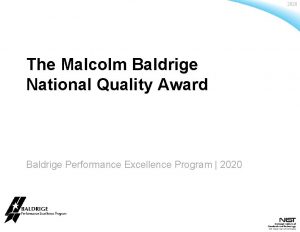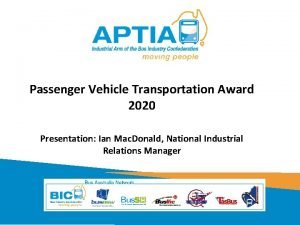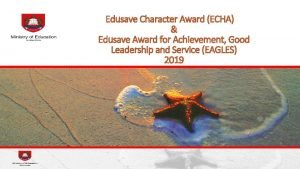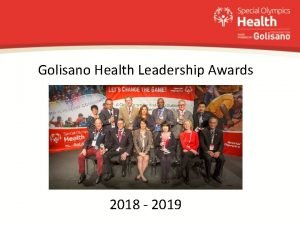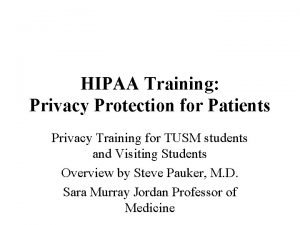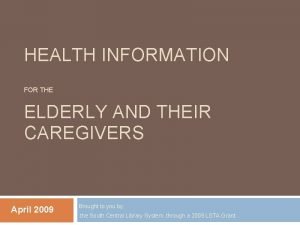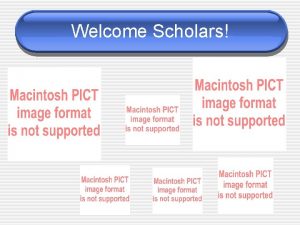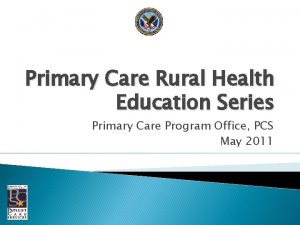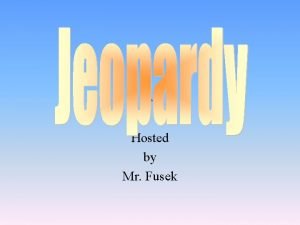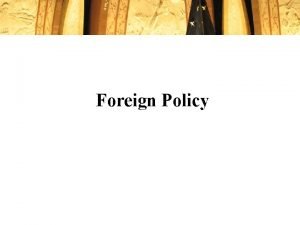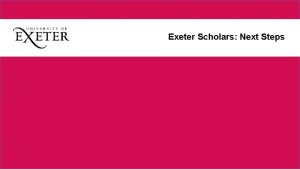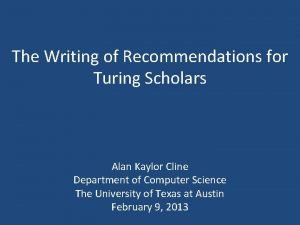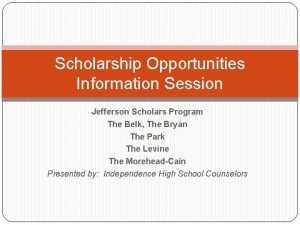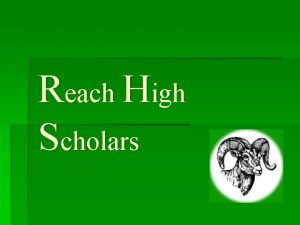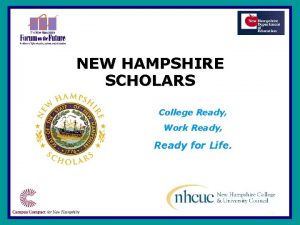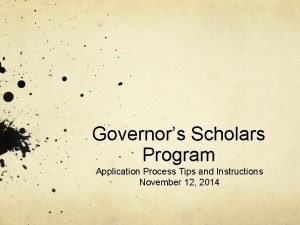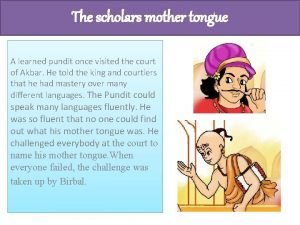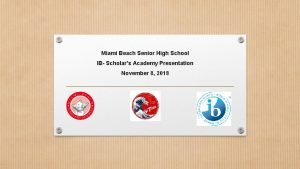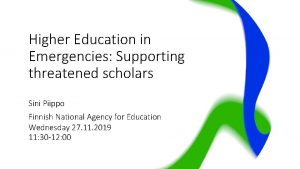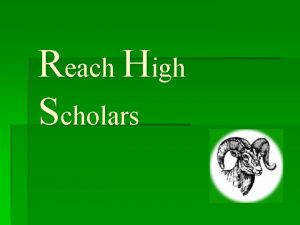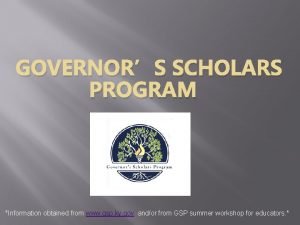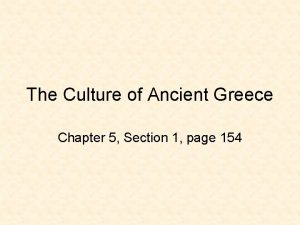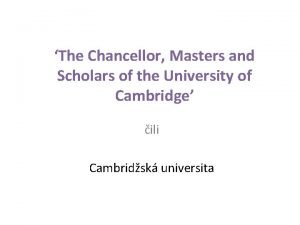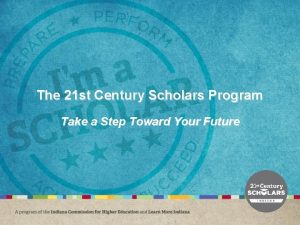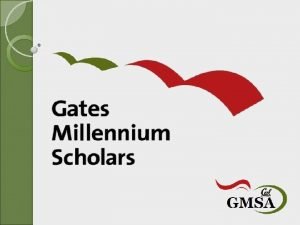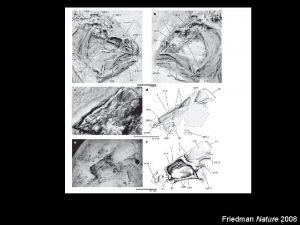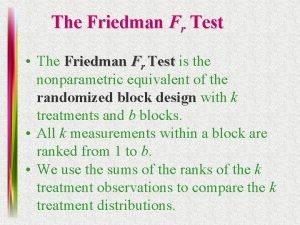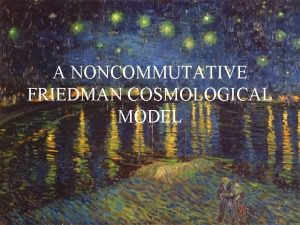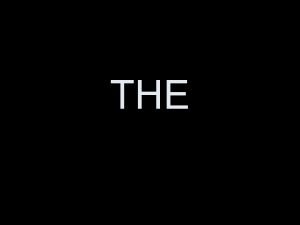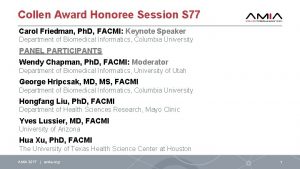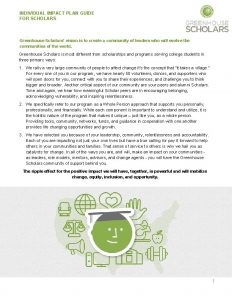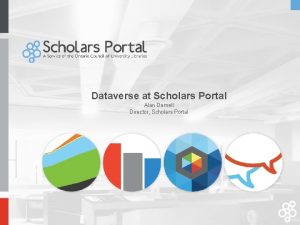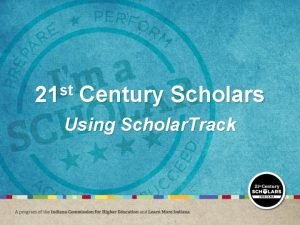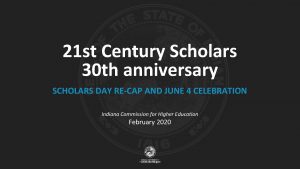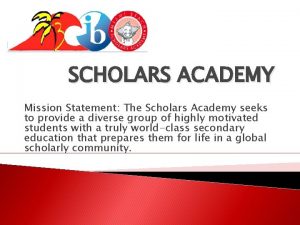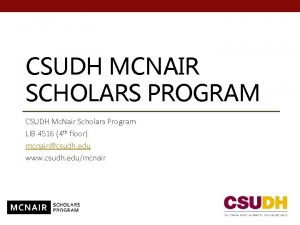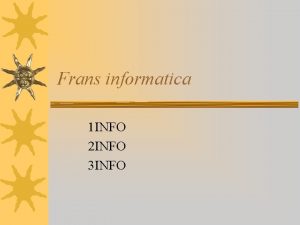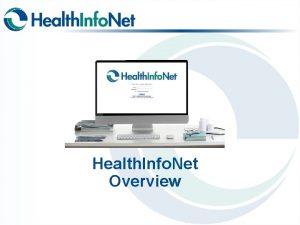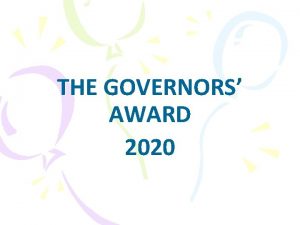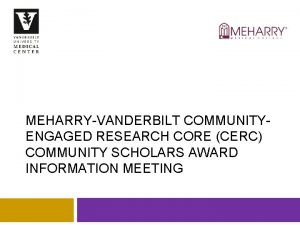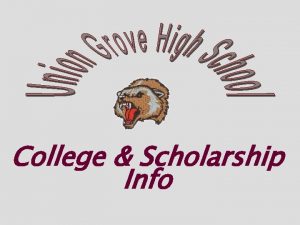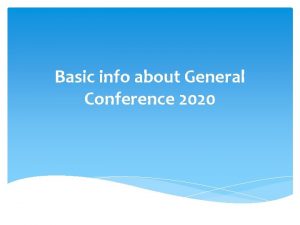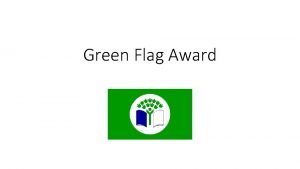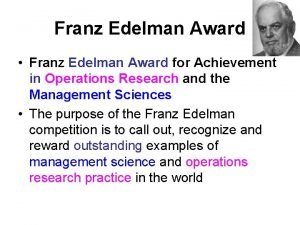2020 FRIEDMAN AWARD FOR SCHOLARS IN HEALTH Info





























- Slides: 29

2020 FRIEDMAN AWARD FOR SCHOLARS IN HEALTH Info session for applicants NATALIE THORSON, GRADUATE AWARDS COORDINATOR

History of the Award: Constance Livingstone & Sydney Friedman • Two of the first appointments to UBC’s Faculty of Medicine, which was founded in 1950. • Established the Department of Anatomy, which was chaired by Sydney Friedman from 1950 -1981. • Together published more than 200 papers. Constance Friedman passed away in June 2011 and Sydney Friedman passed away in February 2015. • The Foundation supports the Friedman Award for Scholars in Health and the Freidman Travel Award (for Medical Undergraduate Students). • 3. 3 million endowment to support these programs given in 2016, and another 6 million endowment given in 2017.

The Goal and Mission of the Friedman Award for Scholars in Health The Friedmans believed that a well-rounded and transformative education includes learning from different perspectives and cultures. Goal: To provide funding to graduate students or medical residents so that they can pursue a learning opportunity to further their career or to bring new perspectives to the education they have already received. Mission: To extend the global reach of UBC graduate students and UBC medical residents and enrich our scholarly community by providing opportunities for our future scholars in the health sciences to learn from global experts in their respective fields.

Past Awardees - 2019 Friedman Scholar Madison Bolger-Munro is studying the contribution of mechanical cues at the immune synapse to the B cell immune response at the Institut Curie (France) 2019 Friedman Scholar Henry Lu is focusing on developing a diagnostic tool for rare immune system disorders called the CBM-opathies at the National Institutes of Health (USA) 2019 Friedman Scholar Maggie Woo Kinshella is undertaking a literature review of maternal nutrition in sub-Saharan Africa (UK / Gambia / Kenya / Mozambique)

Past Awardees - 2018 Friedman Scholar Hooman Esfandiari is developing VR technology uses for spinal procedures at Ludwig Maximilian University of Munich and the Technical University of Munich (Germany) 2018 Friedman Scholar Raquel Baldwinson is studying Global Health and the Rhetoric of Interdisciplinarity as a Visiting Fellow at Harvard (USA / Canada / Rwanda) 2018 Friedman Scholar Andrew Perrin is a medical resident studying how antipsychotic medications impact hippocampal neurogenesis at King’s College, London (UK)

Past awardees have come from a variety of fields, including: • English • Population and Public Health • Microbiology and Immunology • Medical Genetics • Experimental Medicine • Chemistry • Psychology • Health Sciences • Biomedical Engineering

Profile of 2018 recipient Christina Luong Department: Medicine, Cardiology Dates of funded opportunity: July 1, 2018, until June 30, 2019 Location: Rochester, Minnesota at the Mayo Clinic Description: Clinical training in echocardiography with a clinical and research focus on stress echocardiography. Stress echo is a specialized test that evaluates cardiac structure and function during physiologic stress. Funds used for: Living expenses

Profile of 2018 recipient Christina Luong Highlights: • Experience of working within a world-class health system with a focus on patient-centered care and excellence in echocardiography. • Opportunity to work with world leaders in the field of echocardiography (Guideline writers and authorities in the field) • Clinical volumes for specialized testing (stress echo) that are 10 x higher than available locally • Getting to know the culture of the Midwest Any tips for future Friedman applicants? • Consider the institution that will allow you the best clinical training or research environment for your field of interest. This is truly an opportunity to seek out world-class training or research experience. • This scholarship afforded the opportunity to obtain expertise that would benefit British Columbians and allowed me to grow as a clinician

Overview of the Application Process

Key Details Value Up to $50, 000 each will be awarded for six or more months of study. The amount of the award will be at the discretion of the adjudication committee. Duration Six or more months of study Application Deadline March 13, 2020 at 3: 59 pm PST

Eligibility - Applicant • Canadians, permanent residents and international students are eligible • Open to Masters and Doctoral students, Medical Residents • Open to applicants studying/researching in the area of health. “Health” is interpreted very broadly, and includes health promotion and disease prevention, mental health research, laboratory sciences etc. • The applicant does not need to be studying in a Health degree. Past award winners have included a Ph. D candidate in English.

Eligibility – Applicant (cont’d) • Must be a current student/medical resident at UBC as of the application deadline (March 13) – future UBC students starting at UBC later in 2020 are not eligible to apply

Eligibility - Opportunity • Friedman Scholars are expected to travel to other areas of the world to seek new perspectives, learn from experts in their fields and be exposed to different cultures. Applicants carry out scholarly work, gain new knowledge and perspectives in the field of study, and absorb the scholarly culture of the host institution • Acceptable host organizations or groups may include: – Universities – Research centres – NGOs – Private sector companies – Government agencies

Eligibility – Opportunity (cont’d) • Travel must be outside of British Columbia, Alberta, Saskatchewan and Manitoba. • Travel must be for a minimum of 6 months. The travel may be over a longer period (e. g. , one year) if circumstances merit it. Note: remote work from Vancouver would not count as part of the minimum six months period. • Travel must begin no earlier than June 1 of the application year and no later than April 30 of the following year.

Eligibility – Budget Expenses • Funds received from this award are to be used for expenses related to the opportunity. These may include: travel expenses (airfare, visas, health insurance, etc. ), living expenses (rent, groceries, etc. ), fees assessed for related educational endeavours. • Other kinds of research or project-related expenses should include a justification. • The funds may not be used for expenses already incurred or for UBC tuition. None of the funds shall be used to pay down or reduce current or past educational debt, to pay a personal stipend for the learner, or to pay UBC tuition.

Evaluation Criteria • Student/medical resident’s past accomplishments and future promise • The nature and quality of the learning opportunity • The potential impact of the learning/work opportunity on the field of health Full details on the evaluation criteria are on our website: https: //www. grad. ubc. ca/awards/friedman-award-scholars-health

Application Requirements 1. Application form 2. Outline of the educational opportunity (4 pages max) – Description of key personnel, host organization, and their mission and contributions to the broad area of health – Timeline of the opportunity - Include start/end dates and key milestones – Details of the opportunity - Describe the learning environment, learning objectives, specific activities, and expected outcomes – Potential impact of the opportunity on the field of health and on your career and/or personal development

Application Requirements (cont’d) 3. References/bibliography/citation (1 page max) 4. Simple budget (1 page max) 5. Synopsis of your education to date (1 page max) – Can be essay or CV format – Recommended content to include: Awards, Publications 6. Letter of support from UBC supervisor (2 pages max) – For graduate students, your UBC research supervisor – For medical residents, your UBC program director 7. Letter of support from host supervisor (2 pages max)

Application Submission • Online submission form for your application materials – link is provided on our Friedman award webpage • Your 2 referees will submit their letters of support via a separate online submission form - link is provided on our Friedman award webpage

When crafting your application, consider: • Have you worked with the proposed host site previously? – You should include a justification as to why another visit to the same site would be warranted. • Will your host supervisor be someone from your supervisory committee? Have you worked with the host supervisor before? – You should include a justification as to why working with someone you already work with would be warranted. • Adjudicators are looking for the applicant to be undertaking a new experience, so returning to a familiar host site or supervisor requires a justification to be compelling.

When crafting your application, consider: • “Outline of the educational opportunity“ document: – Keep in mind that reviewers will be from similar disciplines but may not be experts in your particular field of study. Write your project summary in language accessible to non-experts (avoid jargon). – It is beneficial to indicate why you’ve selected the particular host site – Why do you need to go to this particular host site for this opportunity? What is special about this host site compared to elsewhere? – Be clear about your plans and goals for this opportunity – speak to “learning objectives”, “expected outcomes” – Important to make a strong case for the “potential impact of the opportunity on the field of health and on your career and/or personal development” • What will happen as a result of your opportunity? • What impact will this experience have on your career?

When crafting your application, consider: • Reference letters from UBC supervisor and host supervisor: – Should indicate strong support for you and your project from the author • Host supervisor letter: – Should indicate importance/impact of the opportunity – Should be clear that the host supervisor knows the applicant and is receptive to and supports the project

When crafting your application, consider: • When contacting your referees: – Contact them far in advance of the application deadline to give them sufficient time to write their letter – Inform them of the application deadline and the method of submission (the online submission link provided on our webpage) – Advise your referees on the evaluation criteria (how reviewers will assess your application) – if their letter can connect to the evaluation criteria, it will strengthen your application

Frequently Asked Questions: • If I have already received an award from UBC or an external agency, am I still eligible to apply for this award? – Yes, provided that your application for the Friedman outlines a learning opportunity whose expenses have not already been funded through another UBC award or external agency. • I am partway through a project abroad – can I apply and use the scholarship to pay for this? – An application for an extension or continuation of a project would typically not be considered a competitive application. • Can the opportunity be connected to my current research? – Yes, but you should explain how this additional funding would allow you to travel somewhere or do something you would not otherwise be able to do.

Frequently Asked Questions: • Can the opportunity be connected to my current research? – Yes, but you should explain how this additional funding would allow you to travel somewhere or do something you would not otherwise be able to do. • Am I eligible to apply if I will graduate before or during the opportunity? – Yes. Applicants just need to be a current student as of the application deadline. • Should transcripts be provided as part of the application? – No. You are not required to submit transcripts for this award. If you submit any transcripts, they will be removed from the application package. • Do I need to have an output from the experience (such as a publication)? – You do not have to have an output such as planning to publish a paper or presenting your findings at a conference. However, this would strengthen your application.

Frequently Asked Questions: • What should be included in the budget? – The budget is a strong indicator of the overall organization of the proposed learning opportunity. All of the major costs need to be reasonable and accounted for. – It is expected that a substantial portion of the budget will be related to travel and living expenses, like rent, food, and airfare. The award funds are meant to facilitate you travelling to have a new experience you could not otherwise do. – Some research and project-related costs are acceptable, however this scholarship is not meant to be a research grant-funding vehicle. – It is acceptable to have a “contingency” or “other” section in the budget in order to account for unexpected costs. However, this section should not account for more than 5 -7% of your total requested award amount.

Frequently Asked Questions: • How are winners chosen? – Applications are reviewed by a committee composed of faculty members from health and health-related disciplines. Applications are assessed by the committee via the “Evaluation Criteria” for the Friedman. • How many awards are given per year? – In recent years, up to 9 applicants have received the Friedman • If my application is successful, when would I receive the funds? – The earliest that the first installment of funds can be paid out is June. • When will applicants hear if their application is successful? – The length of the adjudication process is dependent on the number of applications received in each competition cycle. It is anticipated that applicants will be notified by early May.

Questions?

Additional questions? Contact us at graduate. awards@ubc. ca.
 Friedman award for scholars in health
Friedman award for scholars in health Pre award vs post award
Pre award vs post award Baldrige award winners 2020
Baldrige award winners 2020 Passenger vehicle transportation award 2020 pay rates
Passenger vehicle transportation award 2020 pay rates Singapore echa award
Singapore echa award Golisano health leadership award
Golisano health leadership award Health info
Health info Https://medlineplus.gov/nutritionforolderadults.html
Https://medlineplus.gov/nutritionforolderadults.html Habits of scholars
Habits of scholars Va geriatric scholars program
Va geriatric scholars program During the renaissance, humanist scholars ______.
During the renaissance, humanist scholars ______. The scholars yeats
The scholars yeats Definition of foreign policy by scholars
Definition of foreign policy by scholars Santa monica college honors program
Santa monica college honors program Exeter scholars year 12
Exeter scholars year 12 Turing scholars
Turing scholars Jefferson scholarship nomination
Jefferson scholarship nomination Reach high scholars
Reach high scholars Work ready nh
Work ready nh Governor's scholars program application
Governor's scholars program application What was pundit's mother tongue?
What was pundit's mother tongue? Miami beach senior high school dr. maria t. rodriguez
Miami beach senior high school dr. maria t. rodriguez Threatened scholars integration initiative
Threatened scholars integration initiative Is beowulf an elegy
Is beowulf an elegy Reach high scholars
Reach high scholars Gsp teacher recommendation
Gsp teacher recommendation Why did the city of alexandria attract scholars
Why did the city of alexandria attract scholars Elite scholars academy
Elite scholars academy How to keep your 21st century scholarship
How to keep your 21st century scholarship Millennium scholars program
Millennium scholars program


